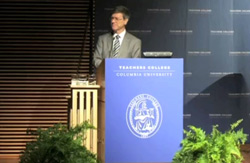With those words, Jeffrey Sachs, Director of Columbia University’s Earth Institute, Special Advisor to United Nations Secretary-General Ban Ki-Moon, and perhaps the world’s best known and most influential economist, launched into a keynote address at Academic Festival 2012 in which he analyzed the unprecedented challenges facing humanity and the potential of information technology to help ensure a sustainable future.
